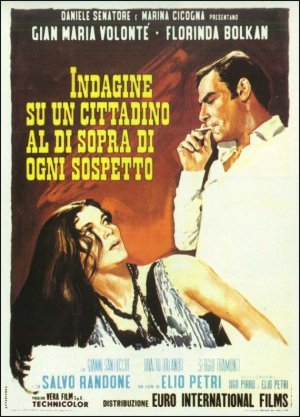
INVESTIGATION OF A CITIZEN ABOVE SUSPICION
Italy, 1969, 114 minutes, Colour.
Gian Maria Volonte, Florinda Bolkan.
Directed by Elio Petri.
Investigation of a Citizen Above Suspicion begins like a continental thriller with a kinky sex murder, but it soon develops into a strong, political thriller especially reminiscent of Z in its severe criticism of extreme right wing self-righteousness. However, it limits its view to Italian justice, bureaucracy and police corruption.
The chief of homicide has been corrupted by a sensuous young woman who is curious about his murder investigations and acts them out with him in bizarre fashion. She treats him like her child (as it emerges from flashbacks) and he murders her. He seems to want to prove that, as a public officer and citizen about to be promoted to a police political department, he is above suspicion. On the other hand, he seems to have a compulsion to be caught.
In the meantime, in his growing insanity, he rigorously pursues demonstrators and the disturbers of the public peace, He likens social instability to moral Instability and rouses his department with demagogic fascist enthusiasm. He is relentless in his methods, in using secret files, torture etc., as he judges necessary.
At the end he has a fantasy about his being arrested and pardoned and we are left unsure whether he will really be believed by his ambitious colleagues or whether they will even want to believe him as the repercussions of the scandal would rebound on them.
The film was well-received at Cannes 1970 and much was said in praise of its courage, in view of the fact that it is a legal offence to criticise Italian police 1n this way. The criticism of right-wing self-righteousness is obvious enough and even heavy-handed; however, the film is convincing and disturbing in Its authentic atmosphere and forcefulness.
It won the Oscar for the Best Foreign Film, 1970.
1. What did the opening sequences of the film lead you to expect? Were your expectation fulfilled? Exactly?
2. How did the official come under the power of his mistress? What was his fascination for her? What was her fascination for him?
3. Did he love her? Why did he think she treated him as a child? Did she?
4. Why did he kill her? Loathing for her or merely to test his position amongst his colleagues and society whether he was, because of his position, 'above suspicion'?
5. How mad was he? What evidence? Did he want to be discovered? How compulsive was his urge?
6. Discuss hie speech to the police when he took over the political section of the police. It looked like typical Italian fascist oratory and enthusiasm-rousing. Was any of the content of his speech true? What did it sound like coming from such a man, especially the need for freedom through suppression?
7. How were the Italian police presented? Italian justice? Were they presented fairly as far as you could judge from the film?
8. The officials manoeuvred for promotion etc. Were they any worse than police of other countries?
9. Discuss the official's attitude towards political dissenters and his torture of them.
10. What was the meaning of the dream-fantasy sequence at the end, when he imagines his colleagues coming to visit him?
11. Do you think he would have been arrested or would his colleagues have let it be, afraid that such a Scandal Would tarnish them?
12. Who was the target of criticism of this film?
13. What did the film have to say about right-wing extremism?
14. Was the film too heavy-handed to be effective or were you moved by it?